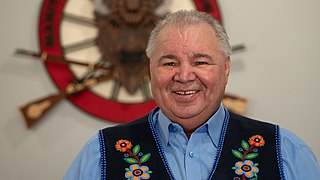The First Nations are groups of Canadian indigenous peoples, who are classified as distinct from the Inuit and Métis. Traditionally, the First Nations were peoples who lived south of the tree line, and mainly south of the Arctic Circle. There are 634 recognized First Nations governments or bands across Canada. Roughly half are located in the provinces of Ontario and British Columbia.

The Métis are Indigenous peoples in the three Prairie Provinces, as well as parts of Ontario, British Columbia, the Northwest Territories, Atlantic Canada, and the Northern United States. They have a shared history and culture and are of mixed Indigenous and European ancestry which became a distinct group through ethnogenesis by the mid-18th century, during the fur trade era.
The Royal Commission into Aboriginal Deaths in Custody (RCIADIC) (1987–1991), also known as the Muirhead Commission, was a Royal Commission appointed by the Australian Government in October 1987 to Federal Court judge James Henry Muirhead, QC, to study and report upon the underlying social, cultural and legal issues behind the deaths in custody of Aboriginal and Torres Strait Islander people, in the light of the high level of such deaths in the 1980s.
The Royal Commission on Aboriginal Peoples (RCAP) was a Canadian royal commission established in 1991 with the aim of investigating the relationship between Indigenous peoples in Canada, the Government of Canada, and Canadian society as a whole. It was launched in response to status and rights issues brought to light following events such as the Oka Crisis and the failure of the Meech Lake Accord. The commission culminated in a final report of 4,000 pages, published in 1996 and set out a 20-year agenda for implementing recommended changes.

Dr. David N. Chartrand, LL.D. (hons), O.M., is a Métis politician and activist who has served as the democratically elected President of the Manitoba Métis Federation since 1997. For more than two decades, he has advanced the cause of the Red River Métis at the provincial, national and international levels while working to improve opportunities for all Manitobans.

The Winnipeg Police Service is the police force of the city of Winnipeg, Manitoba, Canada.
The Congress of Aboriginal Peoples (CAP), founded in 1971, is a national Canadian aboriginal organization, that represents Aboriginal peoples who live off Indian reserves, in either urban or rural areas across Canada. As of 2011, more than 70% of Aboriginal people live off-reserve.

Calvin Murray Sinclair or Mizanay (Mizhana) Gheezhik, is a former member of the Canadian Senate and First Nations lawyer who served as chairman of the Indian Residential Schools Truth and Reconciliation Commission from 2009 to 2015. He previously served as a judge in Manitoba from 1988 to 2009, being the first Indigenous judge appointed in the province. Sinclair was appointed to the Senate of Canada on April 2, 2016. In November 2020, he announced his retirement from the Senate effective January 31, 2021.

The Truth and Reconciliation Commission of Canada was a truth and reconciliation commission active in Canada from 2008 to 2015, organized by the parties of the Indian Residential Schools Settlement Agreement.
Edwin Charles Kimelman served as a judge of the Provincial Court of Manitoba (Canada) and authored a significant public report on child protection for aboriginal peoples.
In Australia, Canada, New Zealand and the United States the term treaty rights specifically refers to rights for indigenous peoples enumerated in treaties with settler societies that arose from European colonization.
Aboriginal child protection describes services designed specifically for protection of the children of "aboriginal" or indigenous peoples, particularly where these peoples are a minority within a country. They may differ at international, national, legal, cultural, social, professional and program levels from general or mainstream child protection services. Fundamental human rights are a source of many of the differences. Aboriginal child protection may be an integral or a distinct aspect of mainstream services or it may be exercised formally or informally by an aboriginal people itself. There has been controversy about systemic genocide in child protection systems enforced with aboriginal children in post-colonial societies.
The Kimelman Report had a substantial and lasting impact on aboriginal child protection in Canada that was part of a fundamental shift in international child protection paradigms for aboriginal peoples.
Edward N. "Ted" Hughes was a Canadian retired judge. He was best known for overseeing prominent investigations in Manitoba, Saskatchewan and British Columbia, one of which led to the resignation of Premier Bill Vander Zalm.
A Gladue report is a type of pre-sentencing and bail hearing report that a Canadian court can request when considering sentencing an offender of Aboriginal background under Section 718.2(e) of the Criminal Code. Gladue was the first case to challenge section 718.2(e) of the criminal code
The Sixties Scoop was a period in which a series of policies were enacted in Canada that enabled child welfare authorities to take, or "scoop up," Indigenous children from their families and communities for placement in foster homes, from which they would be adopted by white families. Despite its name referencing the 1960s, the Sixties Scoop began in the mid-to-late 1950s and persisted into the 1980s.
Richard Cardinal: Cry from a Diary of a Métis Child is a 1986 National Film Board of Canada documentary film by Alanis Obomsawin, about the suicide of Métis youth Richard Stanley Cardinal, who killed himself in 1984 at the age of 17. Cardinal, who had been placed in 28 different homes during his 14 years in Alberta's child welfare system, hanged himself from a cross bar he had nailed between two trees near his last foster home, northwest of Edmonton.
Marion R. Buller is a First Nations jurist in British Columbia. Judge Buller served as the Chief Commissioner for the National Inquiry into Missing and Murdered Indigenous Women and Girls. A member of the Mistawasis First Nation, she was the first First Nations woman to be appointed to the Provincial Court of British Columbia in 1994, and presided in courts throughout B.C. She established the First Nations Courts of British Columbia in 2006 and provided the foundation for the Aboriginal Family Healing Court in 2016. Buller served as President of the Indigenous Bar Association and served as Director of the B.C. Law Court Society, B.C. Law Foundation, B.C. Police Commission and the B.C. Mediators Roster. Buller has lectured and written numerous articles and papers about Aboriginal law, criminal law, family law and human rights.
Indigenous peoples in Canada are significantly overrepresented in the Canadian justice system. They make up approximately 30 per cent of all incarcerated individuals in Canada despite being approximately 4 per cent of the total population. Explanations for this overrepresentation include historical injustices – and the contemporary outcomes which are results of that history – faced by Indigenous peoples, as well as structural issues within the current criminal justice system itself. These issues include over-policing, ineffective representation in court, inadequate application of bail, and over-sentencing, which are all indications of systemic racism. While these issues affect Indigenous peoples broadly, there are specific implications for Indigenous women and youth.
Criminal sentencing in Canada is governed by the Canadian Criminal Code. The Criminal Code, along with the Supreme Court of Canada, have distinguished the treatment of Indigenous individuals within the Canadian Criminal Sentencing Regime.





